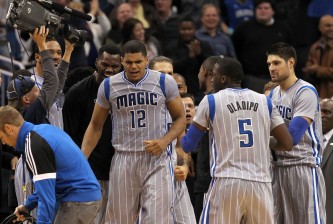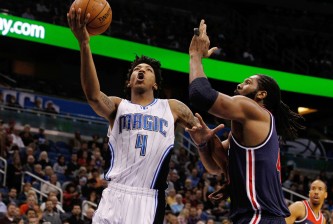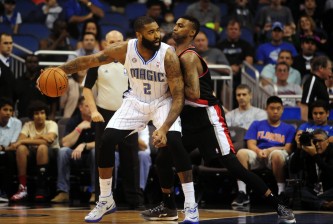Magic Masters is Orlando Magic Daily’s attempt to recognize the best in Magic history. In this edition, we are trying to rank the best teams in Magic history. To see the full tournament bracket, visit the introduction page. Today, we continue the quarterfinals:
The 1996 team has gone largely unappreciated in Magic lore. Like the 2010 team, the 1996 team might have been statistically superior to the team that made the championship the year before. And much like the 2010 team, the 1996 team ran into a buzz saw in the Eastern Conference Finals.
The 72-10 Chicago Bulls are largely regarded as the best team of the 1990s for sure, and possibly even the best team in league history. Orlando was swept out of the Eastern Conference Finals that year — very similar to 2010 indeed — and that disappointment clouded everything about this year. Not to mention that Shaquille O’Neal left the following summer.
Nobody remembers that O’Neal missed the first 22 games of the season. Jon Koncak was starting. And, yes, the Magic handed the Bulls one of those 10 losses with Koncak starting at center.
Nobody remembers this team, like the 2010 team, because of the way the season ended: in disappointment.
Still, the 1996 team is the only Magic team to reach 60 wins in the franchise’s history and might be the team with the greatest what-if in Magic history (what if Michael Jordan never returned, do the Magic win the 1996 title?). They were the first team to get a sweep in the postseason — sweeping by Detroit and coming a few free throws short of sweeping Atlanta (the 2010 comparisons are scary) — and had the same general level of dominance that you would expect from a team thinking championship and nothing else.
This is the year that Penny Hardaway became a true superstar — and maybe had some inkling of becoming the focal point causing a rift with O’Neal. This is the year the future seemed so limitless and the Magic and Bulls would battle for years for Eastern Conference supremacy. It was not to be of course. And that stains the memory of the 1996 team.
Of course it would be a dozen years before Magic fans could seriously begin dreaming of a championship again. In some ways, we did not realize how good we had it as fans.
The 2008 season was the return to glory. The return to the national relevance. The return to mattering. For 12 years, Orlando muddled through the darkness of mediocrity and the lottery in the post-Shaquille O’Neal era. Dwight Howard was “the savior” top overall pick. But he could do no saving.
Not until 2008. Not until the greatest second guessing ever to happen occurred. Not until the fax heard round Sacramento. Not until the questionable free agent signing that brought the Magic to the doorstep of a championship.
Nobody was quite sure what would happen when the Magic bowed out of the first round at the hands of a sweep to the Pistons. Dwight Howard and Jameer Nelson were young and nobody knew where they would go. Finally, Grant Hill’s contract would be off the books. There was a chance to begin re-making the roster.
It started with Billy Donovan accepting and then rejecting the Magic’s job offer. Allowing Otis Smith to make up for that mistake with a hasty fax to Sacramento to secure Stan Van Gundy’s coaching service. With him in tow, they began crafting a vision for the Magic. It started with the signing of Rashard Lewis.
The contract was extremely bloated and Smith likely bargained against himself in offering it. But there was also no doubt the effect it had on the team. With Hedo Turkoglu now firmly in the starting lineup and Lewis spreading the floor to give Dwight Howard some space down low, the Magic transformed into a much different team.
Orlando became a 50-win team for the third time in franchise history. The Magic ranked in the top 10 in offensive and defensive rating, an especially large climb after ranking 22nd in offensive rating the year before under Brian Hill. Van Gundy continued to improve the team, but this was the foundation.
Dwight Howard became a monster in the postseason, averaging 22.6 points per game and 18.2 rebounds per game in the first round. It was his first big step toward superstardom on a national stage. He was no longer just that plucky young big man.
This team obviously needed a lot of growing up. They would get that in the next two years in a trip to the Finals and a trip to the Eastern Conference Finals. But this was quite a first step for a team ready to grow up and become a factor for a championship.
Impact and Historical Significance
Undoubtedly the seeds of Shaquille O’Neal’s departure were laid in the 1996 season. Maybe they were not. At times, it seemed O’Neal was destined to go to Los Angeles and Jerry West showed the league how to clear cap room for a star player for the first time — there is no Knicks tanking for LeBron without West trying it first to score Shaq (ironically, one of the bold moves in that maneuvering was trading high-priced Vlade Divac to Charlotte for high school draft pick Kobe Bryant).
It felt like destiny that the Magic would fall apart when it became clear Michael Jordan still had a lot of gas in the tank and those Bulls teams were quite clearly playing on another level compared to the Magic. Maybe if the actions the team and the fans took in the offseason, things would have ended up differently and we would be viewing the 1996 season as the beginning of a beautiful rivalry between two great teams.
Instead, it is a forgotten season that ended bitterly and frustratingly with the sweep to the Bulls and ultimately with O’Neal’s departure. It would be a long time before the Magic would reach anywhere near these heights.
This team is not remembered at all, even though it amassed the team-record for wins in a single season and had a pretty dominant performance outside the Eastern Conference Finals. It was at least on-par with the 1995 team in a lot of ways and even had a slightly better defensive rating than the 1995 team. Of course, it went up against a juggernaut of an opponent in the Playoffs. And then fell apart. So we don’t remember them as much.
The 2008 team was the foundation for this latest run and it is hard to imagine a time when everyone was excited just to get out of the first round. Do you remember that time? Do you think Dwight Howard remembers that time?
Orlando learned some hard lessons in that Playoff run. The team was not quite ready for primetime and needed to learn that through losing. They learned how to handle success and take the next step for the next season.
The 2008 postseason was really Dwight Howard’s coming out party. He had the sticker dunk at the All-Star Game, he had a monstrous first round series against Toronto, averaging 22.6 points per game and 18.2 rebounds per game, and really came into his own. This was the first year of his ascendance.
And reminds us of a happier time.
The Matchup
| Off. Rtg. | Def. Rtg. | eFG% | O.Reb.% | TO% | FTR | |
| 1995-96 | 112.9 | 106.9 | 52.9 | 29.0 | 13.2 | 23.2 |
| 2007-08 | 111.3 | 105.5 | 53.7 | 23.4 | 13.6 | 25.6 |
Game 1: 2008 99, 1996 98
Game 2: 1996 130, 2008 102
Game 3: 2008 115, 1996 107
Game 4: 2008 110, 1996 81
Game 5: 1996 113, 2008 106
Game 6: 2008 114, 1996 107
Another surprising result in the What If Sports? series by my eyes. It is the second straight upset that has occurred in this series. I am beginning to believe, after reviewing the historical impact of this team, that it is one that might stick in the voting.
The 2008 squad was revolutionary in a lot of ways. Stan Van Gundy fully embraced the idea of playing Rashard Lewis as a stretch-4. Remember a lot of predictors did not think the Magic would even make the Playoffs, much less win the Southeast Division for the first of three consecutive times. It was a bold, bold experiment and caused matchup problems for a lot of teams.
I imagine, Lewis is the kind of player that would give Horace Grant some problems, even on the defensive end. Dwight Howard and Shaquille O’Neal at this time period would be an amazing matchup.
The one thing I question about this matchup is what Orlando might do with Anfernee Hardaway. Maybe you stick Hedo Turkoglu on him or Maurice Evans and try to hide Nelson on Dennis Scott? That would be an interesting matchup decision for Van Gundy to figure out. I am also pretty confident that Stan Van Gundy could outcoach Brian Hill as this series moves on.
The 1996 teams was extremely talented, no doubt on that. The thing that always sticks in my mind as I watch the 1995 and 1996 teams more is that they were not fantastic defensively. More than that, as good as these teams were offensively, it seems very good teams had the ability to come back against them. One thing the Stan Van Gundy teams do very well is make 3-pointers, which means they are never out of the game. Offenses evolved immensely in the the 12 years between these two squads.
The 1996 team is extremely under appreciated — the comparisons, again, between the 1996 team and the 2010 team are scary — but ultimately it appears the 1996 team was clearly just better than its competition, save for the Bulls. the 2008 team was not an elite team quite yet, but I give it a fair shot to win in a head-to-head matchup.
And then when you consider the foundation the 2008 team provided, maybe the 2008 team should get the surprising nod here.
Edge: 2007-08






















